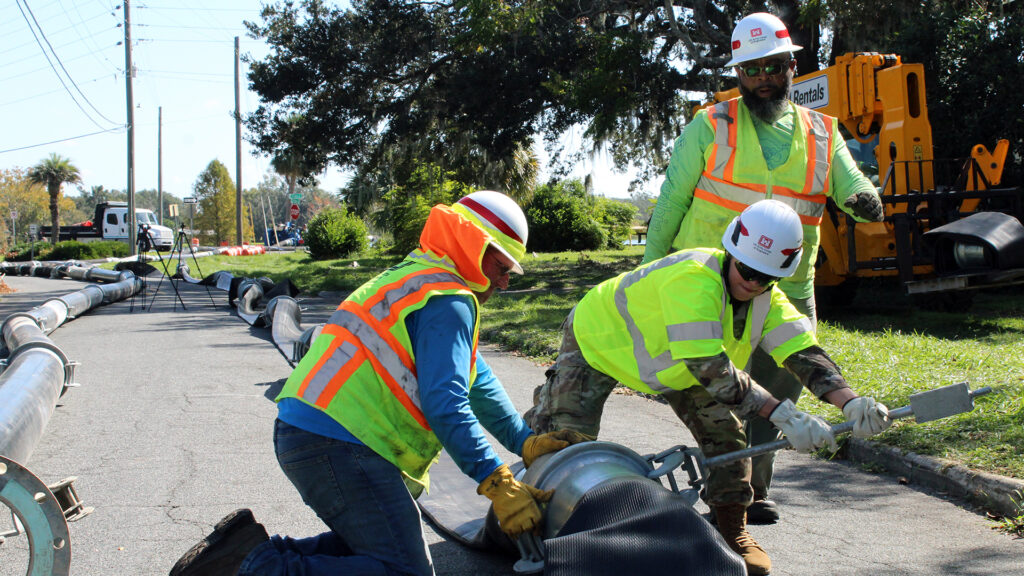By Mia McCormick, Environment Florida
“The floodwater was expected, but I didn’t expect the sewage.” These words have been echoed by neighbors in our low-lying north Pinellas County community, as we recover from the one-two punch of hurricanes Helene and Milton on Florida’s west coast.
“I threw out all of my 9-year-old’s toys and clothes; there was feces floating in our bedroom. The smell is haunting,” said Oldsmar resident Gloria Arnett. This season was just too much for her. After Milton, she put her house on the market.
“You want to cry. You don’t know what to do. There was no saving anything that was below 4 feet in the house,” said neighbor Alexis Anthony. She said brownish-yellow stinky water flowed in through her front door.

I talked to these women in my community two weeks after Hurricane Milton passed. Their stories show the devastating reality of pollution caused by the hurricane, which I have been tracking for the Environment Florida Research & Policy Center.
Our new analysis of pollution reports to the Florida Department of Environmental Protection following Milton reveals at least 70 million gallons were spilled into waterways, neighborhoods and communities across the state. Most of it was sewage, untreated human waste that pushed up through toilets and bathtubs, bubbled out of manholes and overflowed from lift stations and water treatment plants.
Tampa Bay, where I live, saw the worst of the pollution with more than 50 million gallons reportedly spilled, and that data doesn’t even include what was spilled in Hurricane Helene.
The question my neighbors and I are asking is: Why don’t we have wastewater infrastructure that is built to handle storms? Although Hurricane Milton was a major hurricane that went from a Category 1 to a Category 5 storm in just 24 hours, hurricanes are nothing new to our state. Because of warmer water temperatures, they are expected to become stronger and quicker. If our infrastructure is failing now, what will it be like in the future?
Our political leaders step in with recovery efforts after people have been stripped of their belongings, jobs and homes. But we also need them to commit to building a stronger, more storm-resilient state.

Our wastewater infrastructure is aging and failing even in months when rainfall is average. We know our pipes are old, made for a time when a lot less people relied on them. Now is the time for our political leaders to take on this problem with a comprehensive upgrade to our sewer systems statewide.
This would benefit not just our neighborhoods but also our wetlands, streams, bays and oceans. The pollution spilled from hurricanes fuels toxic algal blooms, poisoning our wildlife and choking out sunlight to the seaweed that marine species depend on for food. Not to mention that it threatens the safety of swimmers at our beaches.
We can’t stop these storms from coming. But we can better protect our natural spaces and prepare our communities to better handle what comes with them.
Mia McCormick is an advocate with Environment Florida, a policy and action group with one mission: to build a healthier, greener Sunshine State. Banner photo: The U.S. Army Corps of Engineers delivered three water pumps to Lakeland to relieve Lake Bonny flooding to residences. (Mark Rankin/U.S. Army Corps of Engineers, Jacksonville District; via Defense Visual Information Distribution Service).
If you are interested in submitting an opinion piece to The Invading Sea, email Editor Nathan Crabbe at nc*****@*au.edu. Sign up for The Invading Sea newsletter by visiting here.




Thank you for a compelling report. Anyone who has ever plunged a toilet nose how gross that is. It’s unimaginable to have to plunge your whole house!
One thing missing from these excellent articles is something that Laurie mermaid included in her story, repeated here. “If we don’t start … switching over towards more renewable ways of getting our energy and less reliance on fossil fuels, then this trend will only continue to go up,” Winkley said.
It is certainly important to cover the impacts of our overheated world. It’s equally important to remind readers of the call to action.
I personally think all stories should end with a reminder that the solution is leave fossil fuels in the ground and use natural climate solutions to draw carbon dioxide out of the air.
Thanks for your great work at Invading Sea!